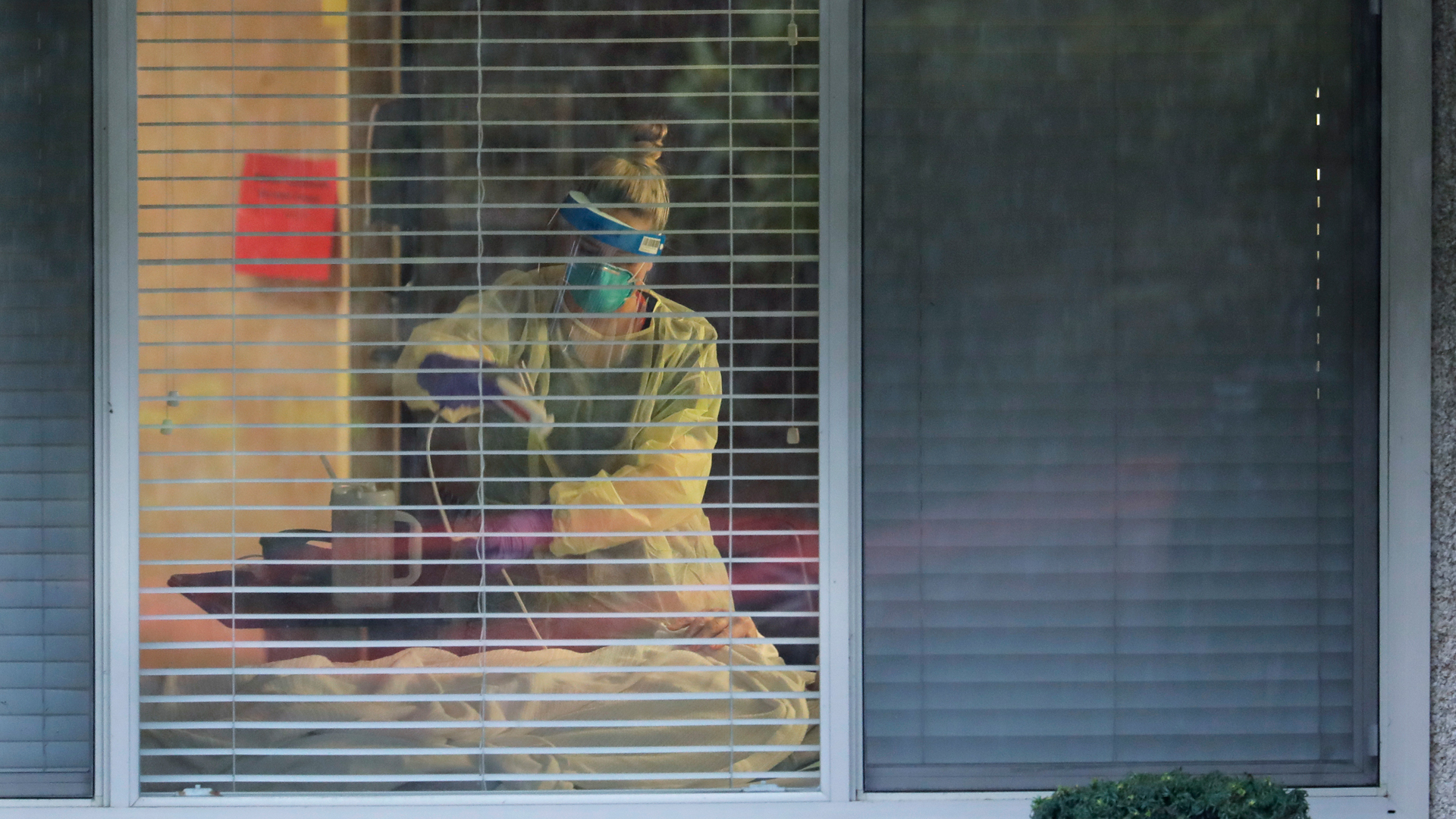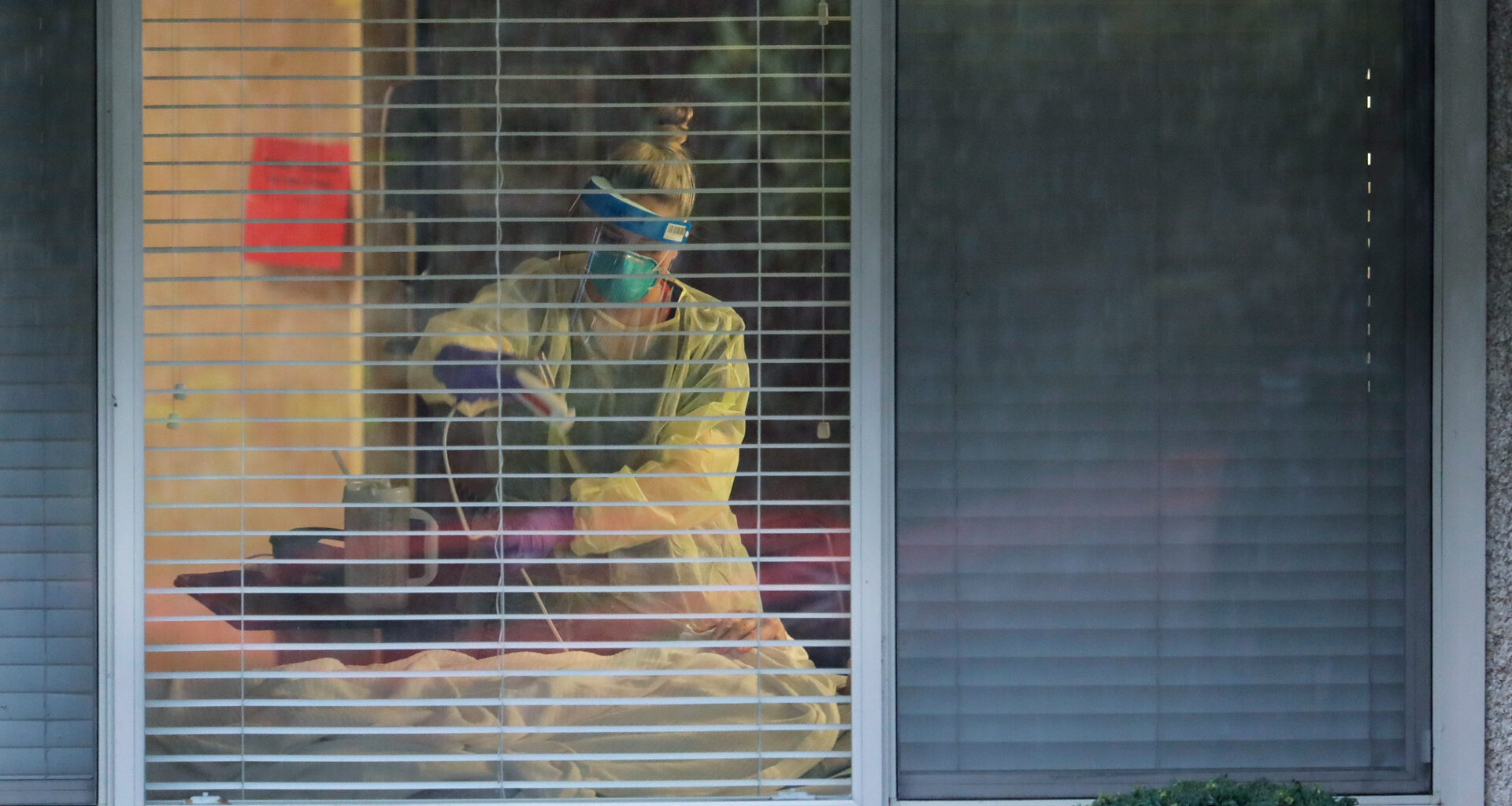 Credit: (AP Photo/Ted S. Warren, File)
Credit: (AP Photo/Ted S. Warren, File)File photo: A nurse working in the room of a nursing home patient who had tested positive for COVID-19
 New Jersey continues to beef up the state’s ability to respond to the next public health emergency using lessons learned from the COVID-19 pandemic that killed more than 37,000 residents and reshaped everything from dining to learning to religious worship.
New Jersey continues to beef up the state’s ability to respond to the next public health emergency using lessons learned from the COVID-19 pandemic that killed more than 37,000 residents and reshaped everything from dining to learning to religious worship.
Officials said a task force of state government leaders continues to meet almost every month to identify ways New Jersey can better protect its citizens from ongoing threats, like respiratory viruses such as influenza and RSV, or respiratory syncytial virus, which are now driving more people to the emergency room than COVID-19, according to the latest report.
The Legislature is also advancing proposals to strengthen the state’s emergency response, including a measure enabling the state Department of Health to stock up on “medical countermeasures, products and therapeutics” in advance of a crisis, which passed the Senate health committee early this month.
Unprepared for the pandemic
Many of these reforms are rooted in a sobering independent assessment of the state’s COVID-19 response, published in March, which found New Jersey was unprepared for the outbreak. The coronavirus, which emerged here in April 2020, has infected more than 2.7 million residents and landed about 191,000 in the hospital.
‘Equitably addressing disasters requires a transformational change in our thinking, focusing on prevention and an inclusive strategy for all persons…’ — Tanya Pagán Raggio-Ashley, chair of COVID-19 Pandemic Task Force on Racial and Health Disparities
The work to implement these changes is far from finished. Like the other crisis response reform bills, the legislation calling for the Health Department to stock up requires additional hearings in both the Senate and Assembly. Local health officials remain worried about the lack of sustainable funding for their work, which is supported largely by local property-tax dollars in New Jersey.
In addition, a report from the COVID-19 Pandemic Task Force on Racial and Health Disparities — quietly released in October — offered dozens of additional recommendations on how to reduce health inequities, starting with formally recognizing racism as an ongoing public health crisis. It called for a council to address this fact, legislation to require health equity officers in all major hospitals, policy changes to elevate community-based organizations’ role in crisis response and other steps to address social determinants of health, like racism, poverty and lack of education.
Task force report
“The report recommendations are meant to amplify the voices of New Jersey’s most vulnerable residents and communities adversely impacted by COVID-19. The recommendations, therefore, address a plethora of ‘isms,’ including systemic and structural racism, considered a public health threat by the Centers for Disease Control and Prevention,” wrote the task force chair, Dr. Tanya Pagán Raggio-Ashley, a pediatrician and hospital expert who graduated from Rutgers’ Robert Wood Johnson Medical School, in New Brunswick.
“Equitably addressing disasters requires a transformational change in our thinking, focusing on prevention and an inclusive strategy for all persons. This is not merely an obligation but a unique opportunity to do better, because the people of New Jersey deserve nothing less,” she wrote.
A disclaimer in the report notes it reflects the views of the task force members, not necessarily “Governor Murphy’s Administration” and state agencies in general, and that the group had prepared a preliminary draft by spring 2022.
Here’s a recap of NJ Spotlight News’ coverage of New Jersey’s steps to improve its pandemic response in 2024.
Report: Administration’s patchy COVID-19 response led to needless deaths, suffering
New Jersey had a statewide influenza response plan and a playbook to deal with other large-scale hazards. The state had direct experience with H1N1, an influenza outbreak in 2009, as well as West Nile and Ebola, infectious diseases that emerged here in 2012 and 2014. It was one of six states to participate in a federal public health preparedness workshop in 2018.
But these resources proved of limited value when COVID-19 was detected in New Jersey in March 2020, according to an independent report on the Murphy administration’s response to the pandemic released Monday. It found the state — and nation — were unprepared to respond to such a crisis. Few state leaders were aware of the flu plan, the report found, and the broader emergency response plan did not model for a pandemic. The state also passed on the federal “Crimson Contagion 2019 Functional Exercise,” which involved a hypothetical outbreak of a highly contagious virus from China and could have been a valuable lesson in advance of the COVID-19 onset a year later.
Those gaps, when combined with the profound lack of knowledge about the virus itself — a global problem, at first — and shortages in critical supplies, like masks, exacerbated sickness and death in New Jersey, the report notes.
“New Jersey has been through trauma and tragedy as a result of the COVID-19 pandemic. The State was not properly prepared. Too many New Jerseyans died, got sick and suffered enormously. The lessons learned from the pandemic were paid for dearly, and must be heeded,” wrote attorney Paul Zoubek, of Montgomery McCracken Walker & Rhodes, who led the 15-month review process. Zoubek and the firm had been paid $3.7 million for this work, through November.
The report, requested by Gov. Phil Murphy who called for an examination of the state’s COVID-19 response, should serve as a memorial to those lost, Zoubek said, and also a “call to action” to invest in public health infrastructure, collaborative emergency response planning and training, efforts to improve health equity and other gaps that emerged during the pandemic. “Despite the lessons of the last four years, New Jersey remains underprepared for the next emergency.”
Read the full story here.
NJ public health system is seriously underfunded, lawmaker warns
When New Jersey officials finalized the latest yearly public spending plan in June they agreed to more than $600 million in late additions for a range of programs including money for community colleges, soup kitchens and baseball fields.
But despite long-standing calls for greater investment in public health — echoed by the state’s own COVID-19 after-action report — the $56.6 billion budget for the fiscal year that began in July did not include additional dollars for the 104 local public health offices. In addition, federal emergency funding provided during the pandemic has largely been depleted.
“It’s sad, really” that public health has not emerged as a funding priority, said Sen. Vin Gopal (D-Monmouth), who is leading a push to provide an extra $10 million to these programs each year. “It’s a drop in the bucket, really. Honestly it should be a lot more than $10 million.”
Gopal told NJ Spotlight News last week that he would continue to lobby for bipartisan legislation (S-2010) he has championed that would reestablish the Public Health Priority Fund, which lapsed under former Gov. Chris Christie, a Republican, and provide it $10 million a year. Gopal said he and other lawmakers have also talked with state Health Commissioner Dr. Kaitlan Baston and other state officials about the potential for including more for public health in the Health Department’s annual budget.
“We’re going to push our legislation this session, but we’re also going to, in a dual purpose, push to get it into the [Health Department’s] budget,” Gopal said. “Obviously they’ve got a lot of priorities, but I’m hoping there will be a full-court press.”
Read the full story here.
Prepping NJ for the next pandemic
New Jersey lawmakers on Monday advanced a handful of new proposals to help the state better prepare for future pandemics, strengthen local public health offices and further coordinate emergency response efforts, issues experts have flagged as concerns in the wake of COVID-19.
The lawmakers also narrowly approved a more controversial measure championed by committee chairman Herb Conaway Jr. (D-Burlington) that would make it a crime for health care professionals to disseminate misinformation, with penalties to be established by licensing boards.
“One of the major challenges we are facing in public health is misinformation,” said Conaway, a physician and public health leader in Burlington County. When doctors or nurses spread falsehoods about vaccines or potential treatments, “and do not seem to take their responsibility [as a clinician] seriously,” Conaway said, “it makes it harder for us to do the job we’re assigned to do, which is protect public health.”
The bills, all sponsored by Democrats, passed the Democratic-led Assembly Health Committee with some Republican opposition. All require additional votes in the Assembly and Senate before they could be signed into law.
Read the full story here.

